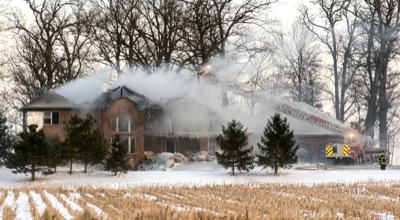Thursday, January 23rd, 2014
Farmers: Law 'no big deal'
Ohio proposal similar to rules in watershed
By Shelley Grieshop
COLUMBUS - Ohio senators on Wednesday approved statewide regulations for fertilizer runoff to protect inland lakes, including Grand Lake.
Senate Bill 150, introduced in May, now heads to the Ohio House for review and approval. If passed, Ohio would be the first state in the nation to have such legislation, according to bill co-sponsor Sen. Cliff Hite, R-Findlay, who represents portions of Auglaize County.
The pending legislation requires training and certification for fertilizer application but does not include rules for livestock manure, such as those recently implemented for Grand Lake Watershed farmers to protect water quality of the local lake.
Fertilizer is defined in SB150 as "any substance containing nitrogen, phosphorus or potassium, or any recognized plant nutrient element or compound that is used for its plant nutrient content or for compounding mixed fertilizers."
The pending law also promotes the development of voluntary nutrient management plans, which is now required for farmers in the Grand Lake Watershed.
Matt Heckler, a technician with the Mercer County Soil and Water Conservation District, said the rules requiring certification for commercial fertilizer application would have more effect on farmers in the northern portion of the county.
"They have a lot less livestock up there so they use more commercial fertilizer," he said.
He called the bill's promotion of nutrient management plans "no big deal" to farmers in the Grand Lake Watershed.
"Most of them, probably 99 percent, are already doing them," he said.
Hite said the bill "seeks to provide proper standards to ensure the responsible use of agriculture nutrients in a way that protects the state's water quality."
"Awhile back the directors of agriculture, ODNR (Ohio Department of Natural Resources) and EPA (Environmental Protection Agency) came to me about the algae bloom problem all over Ohio," he told The Daily Standard on Wednesday. "Something needed to be done."
Hite, who sponsored the bill with Sen. Bob Peterson, R-Sabina, said the legislation shows "the ag world put their foot forward in a positive way to help control the problem."
He admits it's not a cure-all for the state's algae woes.
"This bill will not automatically change the problems we have ... it's not going to change anything immediately on its own, but we need it to provide education," Hite said, adding various civil penalties would be levied against violators by the department of agriculture.
The legislation was designed to strike a "healthy balance" between preserving the health of Ohio's inland lakes and ensuring the profitability of the ag industry, said Hite, who is the chairman of the Senate Agriculture Committee.
The bill would require farmers to undergo training and receive certification from the state before applying fertilizer for agriculture production. Individuals applying start-up fertilizer or who apply it to 50 contiguous acres or less would not require certification.
SB150 also requires owners or operators of agricultural land to develop voluntary nutrient management plans containing results of soil tests, identification of nutrients applied, documentation of the application of nutrients and field information. The plans, in the Senate bill language, must be submitted every five years to the Soil and Water Conservation District for approval.
Farmers in the Grand Lake Watershed are required to create nutrient management plans as part of a strategic plan to prevent phosphorus in manure runoff from entering the lake.
Phosphorus is known to feed and promote growth of blue-green algae. The state for five consecutive years has placed Grand Lake under a water advisory due to unsafe levels of algae toxins.
Hite said the final language in SB150 garnered support statewide.
"We discussed it with people all across the state last year at county fairs and other events," he said, adding the comments gathered help tweak the final legislation. "It (the bill) ended with no opposition."
Ohio reportedly has more than 2,500 inland lakes that span two or more acres. Grand Lake is the largest inland lake in the state with 13,849 acres.



